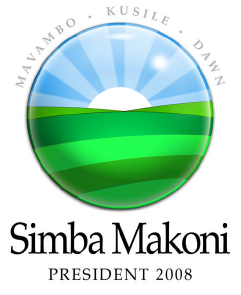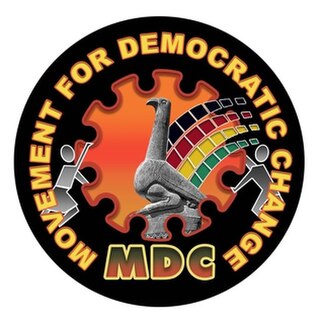
The Zimbabwe African National Union – Patriotic Front (ZANU–PF) is a political organisation which has been the ruling party of Zimbabwe since independence in 1980. The party was led for many years under Robert Mugabe, first as Prime Minister with the Zimbabwe African National Union (ZANu) and then as President from 1987 after the merger with the Zimbabwe African People's Union (ZAPU) and retaining the name ZANU–PF, until 2017, when he was removed as leader.
Jonathan Nathaniel Mlevu Moyo is a Zimbabwean politician who served in the government of Zimbabwe as Minister of Higher Education from 2015 to 2017. He was previously Minister of Information and Publicity from 2000 to 2005 and again from 2013 to 2015. He was elected to the House of Assembly of Zimbabwe as an independent candidate in 2005 and 2008. He is considered the core architect of the AIPPA and POSA restrictive legislation.

Parliamentary elections were held in Zimbabwe on 31 March 2005 to elect members to the Zimbabwe House of Assembly. All of the 120 elected seats in the 150-seat House of Assembly were up for election.
Isaak Stanislaus Gorerazvo Mudenge was a Zimbabwean politician who served in the government of Zimbabwe as Minister of Foreign Affairs from 1995 to 2005 and as Minister of Higher Education from 2005 to 2012.
Patrick Antony Chinamasa is a Zimbabwean politician who served in the government of Zimbabwe as the minister of various cabinet ministries. Previously he served as the Minister of Finance and Investment Promotion and the Minister of Justice, Legal and Parliamentary Affairs.

Mwenezi is a small district situated in southern Zimbabwe. It is bisected by the Mwenezi River and the A4 highway, the main thoroughfare that connects the town of Beitbridge, on the border with South Africa, to Masvingo.
Simbarashe Herbert Stanley Makoni is a Zimbabwean politician and was a candidate for the March 2008 presidential election against incumbent Robert Mugabe. He was Minister of Finance and Economic Development in President Robert Mugabe's cabinet from 2000 to 2002. He faced strong opposition during the Economic Change in Zimbabwe in the early 2000s as his policies contradicted those of the rest of the ZANU-PF party.
Munacho T.A. Mutezo is a Zimbabwean engineer, businessman and politician. He was born on 14 February 1954 in Chimanimani, Zimbabwe.
Joseph Chinotimba is a Zimbabwean political figure. He rose to prominence during the invasions of white-owned commercial farms that started after the 2000 referendum in Zimbabwe. He is widely regarded as a militant ZANU-PF cadre with unquestionable allegiance to the old guard of the ruling party. He is the National Vice-Chairman of the Zimbabwe National Liberation War Veterans Association.

Masvingo District encampases metropolitan Masvingo, in Masvingo Province in southern Zimbabwe. The district boasts of the Great Zimbabwe National Monument among its list of tourist attractions. Lake Kyle is also nearby. The people in the district are mostly rural, communal farmers. Mushandike Co-op. is found in the district, in which the villagers use the water from Tokwe River to irrigate their patches of land. Ngomahuru Hospital which is the second largest Psychiatric hospital in the country is also located.

In January, 2008 the BBC reported that Simba Makoni might be nominated to run against Robert Mugabe in the Zimbabwean 2008 presidential election.
Daniel Kuzozvirava Shumba is a former Zimbabwe Army colonel and businessman; he came back into active politics and rose to Masvingo Provincial Chairman and member of the Central Committee [(the highest organ)] of the ZANU-PF political party. He is a son of a founding member of ZANU, and had a strong political background. He underwent Zanla's basic military training at Chisamba, Zambia, in 1978 before continuing with his academics. Shumba's accolades extend to having served in the Special Forces of the Zimbabwe National Army from 1983 to 1989. He established himself as a fearless fighter.
This article gives details about the vote counting system for the 2008 Zimbabwe presidential election

Before its split in 2005, the Movement for Democratic Change (MDC) was a Zimbabwean political party organised under the leadership of Morgan Tsvangirai. The MDC was formed in 1999 as an opposition party to President Robert Mugabe's Zimbabwe African National Union – Patriotic Front (Zanu-PF). The MDC was made up of many civic groups who campaigned for the "No" vote in the 2000 constitutional referendum, which would limit a president's service to two terms, before the introduction of a Prime Minister, as well as giving legal immunities to the State. However, as the term limit was not retroactive, Mugabe could still have maintained the presidency for two more terms. The most controversial part of the constitution was the land reform policies. It stated that, as in the Lancaster House Agreement, Britain would fund land reform from white settlers to landless black peasants. If Britain failed to compensate the farmers, the government would take the farms, without compensation. The party split over whether to contest the 2005 senate election, into the Movement for Democratic Change – Tsvangirai (MDC-T), the larger party led by Morgan Tsvangirai, and the Movement for Democratic Change – Ncube, a smaller faction then led by Arthur Mutambara and later led by Welshman Ncube. However, the two factions formed an electoral pact for the 2018 Zimbabwean general election called the MDC Alliance and re-united under the original name, the Movement for Democratic Change (MDC), in September 2018.

The Movement for Democratic Change – Tsvangirai (MDC–T) was a center-left political party and was the main opposition party in the House of Assembly of Zimbabwe ahead of the 2018 elections. After the split of the original Movement for Democratic Change in 2005, the MDC–T remained the major opposition faction, while a smaller faction, the Movement for Democratic Change – Ncube, or MDC–N, was led by Welshman Ncube. The two parties re-united in 2018 under the original name, the Movement for Democratic Change.
The Zimbabwe African People's Union – Federal Party is a minor Zimbabwean political party, based in Matabeleland. ZAPU-FP split from Agrippa Madlela's ZAPU party, purportedly a revival of those members of ZAPU who had rejected the 1987 merger with ZANU-PF in January 2002, following ZAPU's decision not to contest the Zimbabwean presidential election, 2002 and amidst accusations that ZAPU-FP founder Paul Siwela had accepted payments from ZANU-PF to run in the election and thereby split the anti-Mugabe vote in Matabeleland.
The United Parties (UP) is a political party founded in Zimbabwe in 1994 and was led by retired Bishop Abel Muzorewa. The UP is an amalgamation of Muzorewa's former party, United African National Council, and a Matebeleland and Masvingo-based faction of the Forum Party which had been formed in 1993. The UP also received members from the Zimbabwe Unity Movement, the party founded by former ZANU PF secretary general Edgar Tekere in 1989.

General elections were held in Zimbabwe on 29 March 2008 to elect the President and Parliament. Because of Zimbabwe's dire economic situation, the elections were expected to provide incumbent President Robert Mugabe with his toughest electoral challenge to date. Mugabe's opponents were critical of the handling of the electoral process, and the government was accused of planning to rig the election. Human Rights Watch said that the election was likely to be "deeply flawed."

General elections were held in Zimbabwe on 30 July 2018 to elect the President and members of both houses of Parliament. Held eight months after the 2017 coup d'état, the election was the first since independence in which former President Robert Mugabe was not a candidate.
Masvingo South is a constituency represented in the House of Assembly of the Parliament of Zimbabwe. Created for the 1985 election, its territory is an area south of central Masvingo, in Masvingo Province in southeastern Zimbabwe. Its inaugural member, Eddison Zvobgo of ZANU–PF, held the seat for 19 years until his death in 2004. The current MP since the 2018 election is Claudious Maronge of ZANU–PF.








